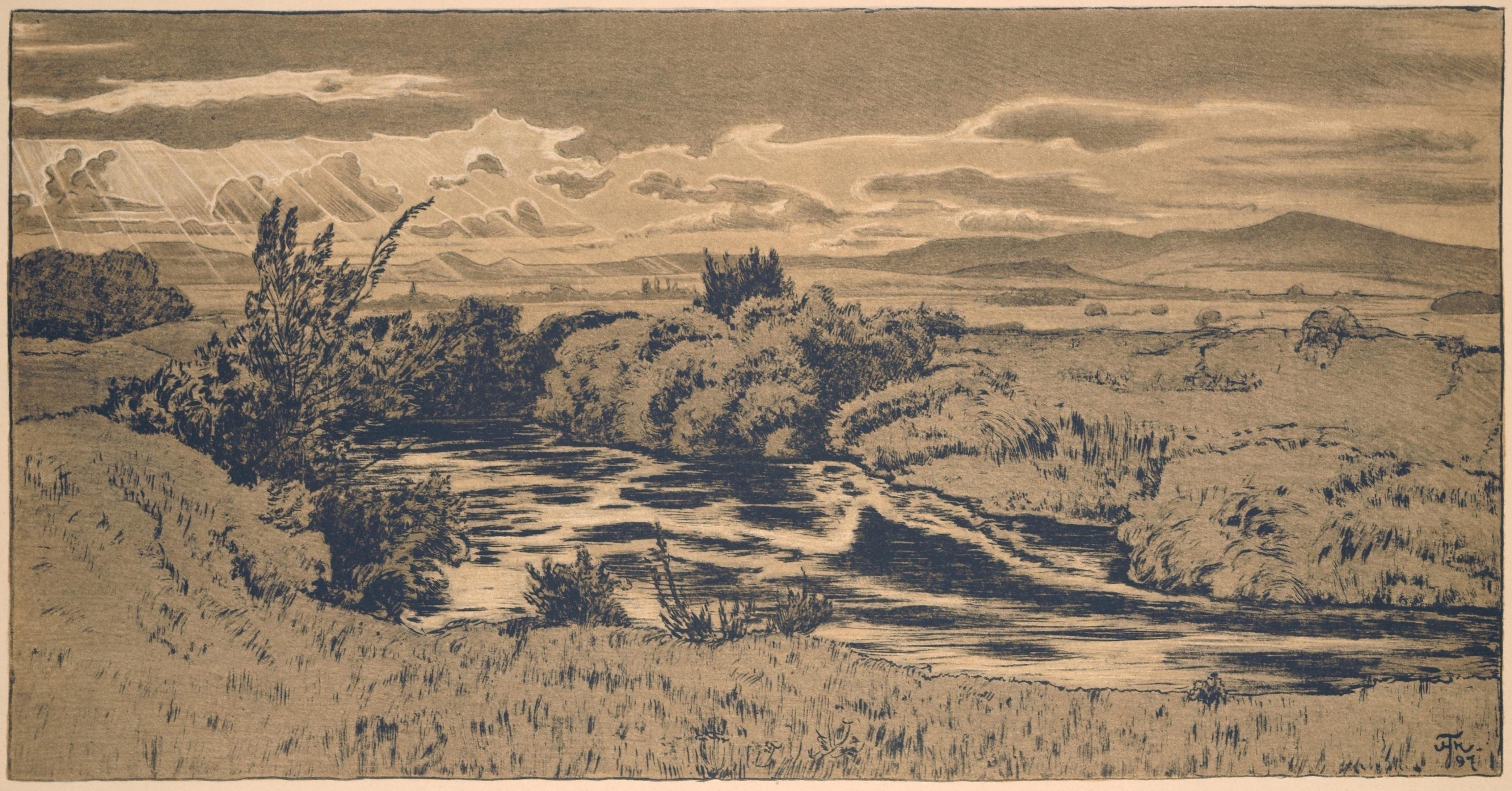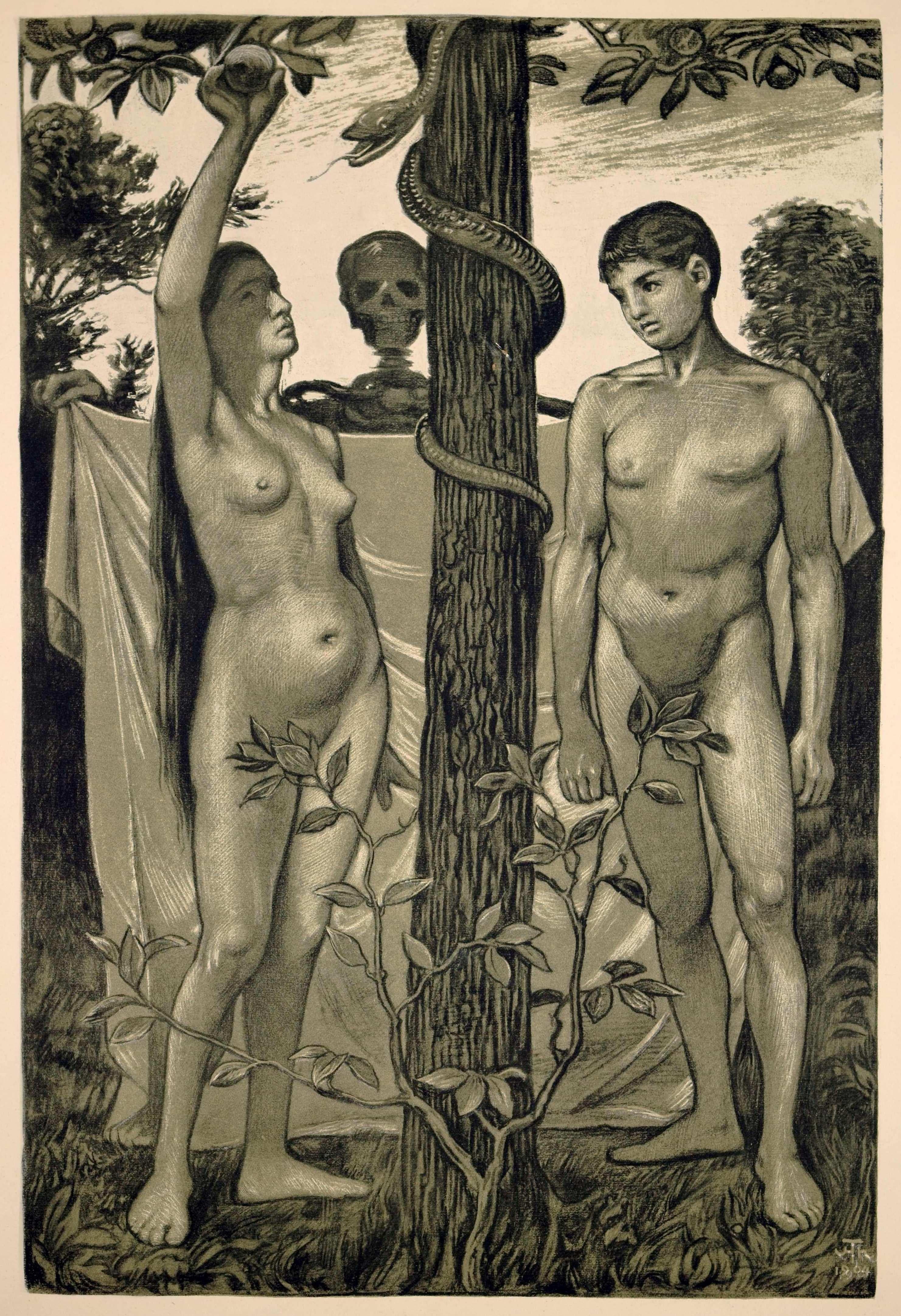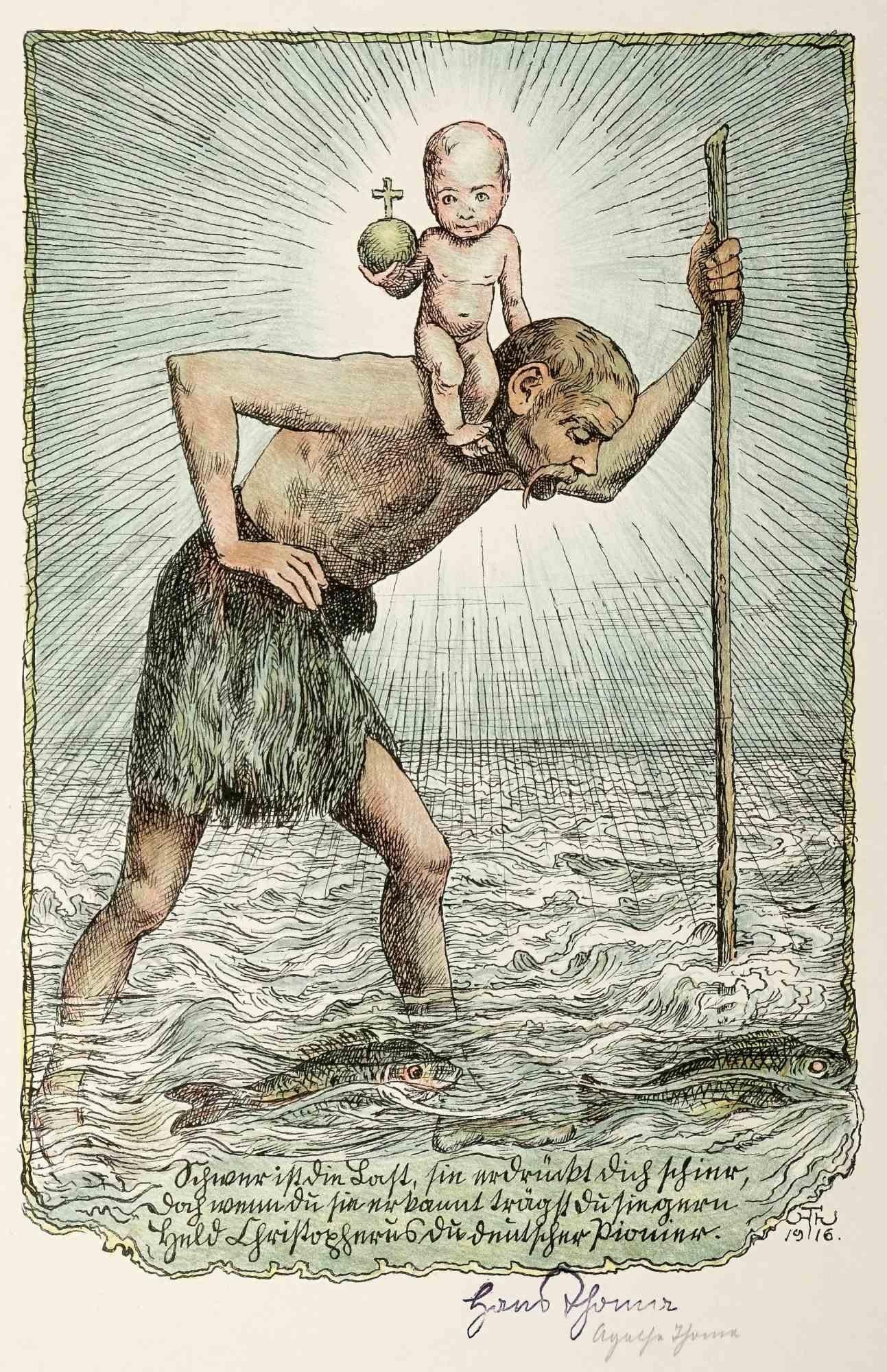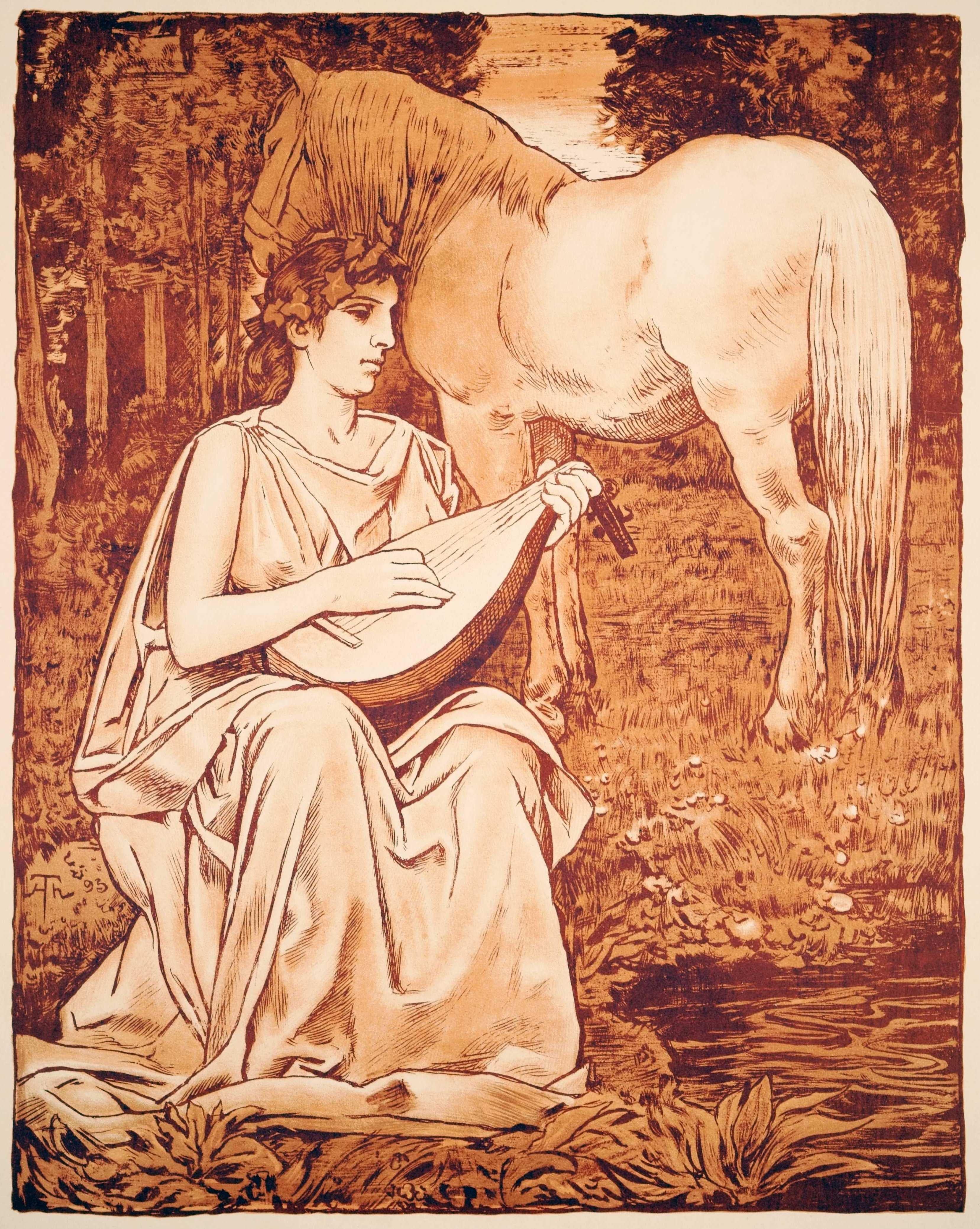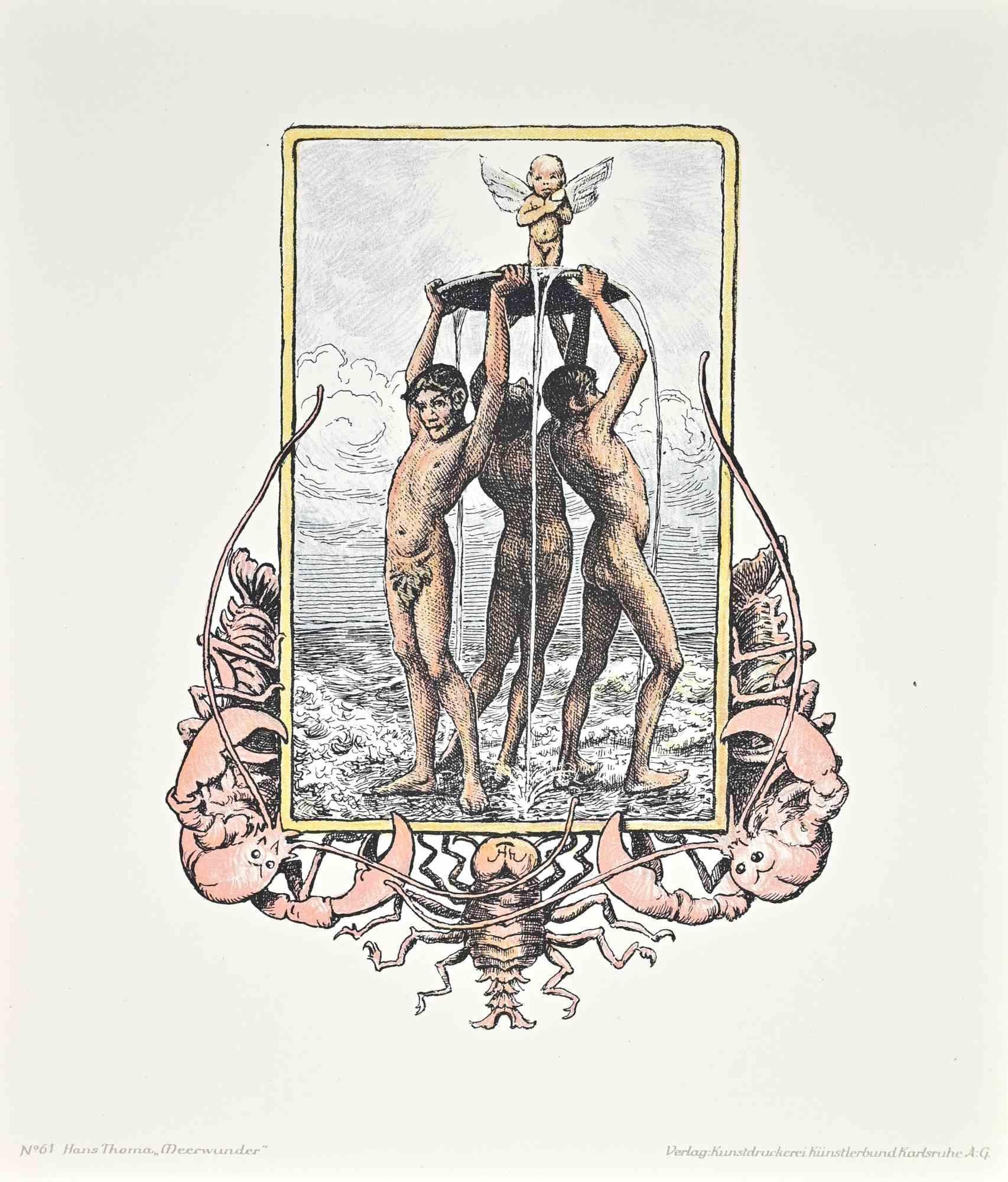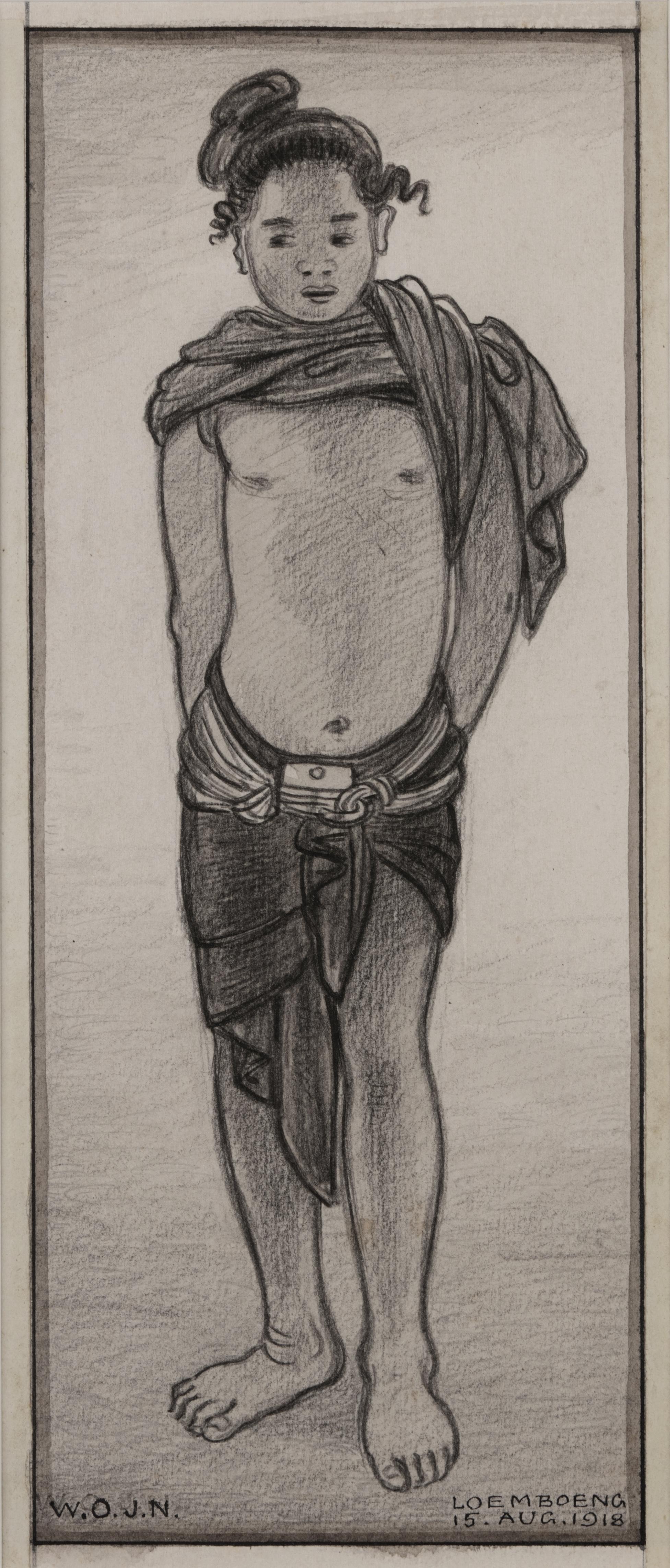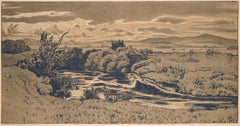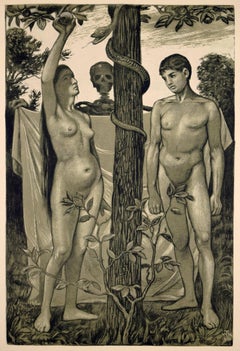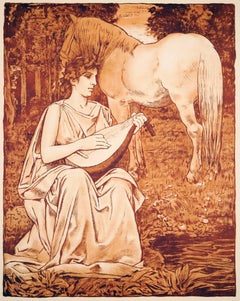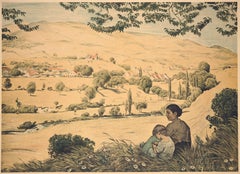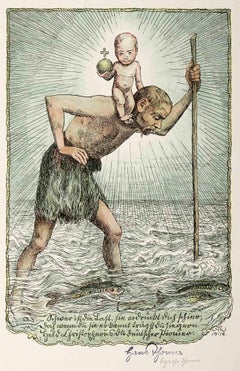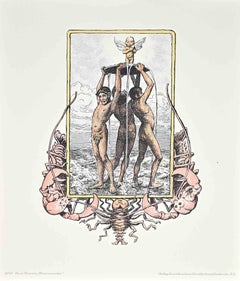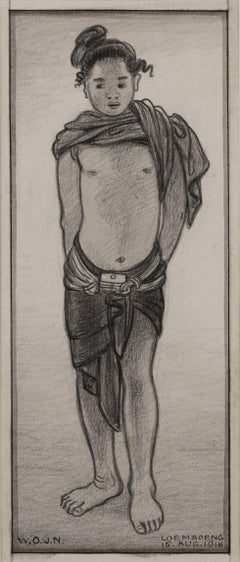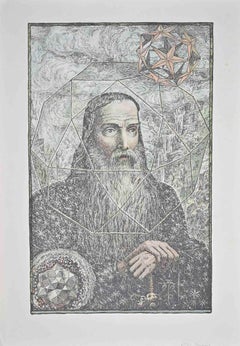Items Similar to Boy at the source / - Elixir of Life -
Want more images or videos?
Request additional images or videos from the seller
1 of 7
Hans ThomaBoy at the source / - Elixir of Life -1897
1897
$264.96
$331.2020% Off
£200.09
£250.1120% Off
€224
€28020% Off
CA$370.56
CA$463.2020% Off
A$405.32
A$506.6520% Off
CHF 212.70
CHF 265.8820% Off
MX$4,847.40
MX$6,059.2520% Off
NOK 2,684.28
NOK 3,355.3620% Off
SEK 2,504.11
SEK 3,130.1420% Off
DKK 1,706.33
DKK 2,132.9120% Off
About the Item
Hans Thoma (1839 Bernau - 1924 Karlsruhe), Boy at the source, 1897. Algraph on strong wove paper after a drawing from 1897, published by Breitkopf und Härtel in Leipzig as ‘Zeitgenössisches Kunstblatt Nr. 144’, 36 cm x 45 cm (image), 40 cm x 50 cm (sheet size), signed and dated on the left in the rock, signed and dated on the lower right below the image. With publisher's sticker on the reverse
- Corners somewhat bumped and slight crease at bottom right, otherwise in very good condition
- Elixir of Life -
A naked boy discovers a spring in a forest thicket and marvels at the water flowing out of a dark cave. Hans Thoma, always concerned with deeper meanings in his paintings, creates an allegory inspired by Philipp Otto Runge's Romanticism and depictions of springs. The young man's nakedness symbolizes the vulnerability of human existence. Lost in the thicket of life, he hopelessly searches for meaning. Suddenly, he discovers the spring, his external and internal elixir of life.
About the artist
After failing to complete his apprenticeship as a lithographer, painter and clockmaker, Hans Thoma trained as an autodidact painter. In 1859 he won a scholarship to the Karlsruhe Art School, where he became a student of Wilhelm Schirmer and Ludwig Des Coudres. After graduating in 1866, Thoma spent time in Basel and Düsseldorf. He met Otto Scholderer, with whom he traveled to Paris in 1868. There he was impressed by the art of Gustave Courbet and the Barbizon School. After his works were rejected by the Karlsruhe Kunstverein, Thoma moved to Munich in 1870, where he was close to the Leibl circle. Wilhelm Trüber worked for a time in Thoma's studio in Munich. In 1874 he made the first of a series of trips to Italy with the painter Albert Lang, where he met Hans von Marées and Adolph von Hildebrand and became friends with Arnold Böcklin, whose art made a lasting impression on Thoma. On his return to Munich, Thoma became a student of Cella Berteneder, whom he married in 1877.
Thoma traveled to England in 1879 at the invitation of art collector Charles Minoprio. Over the years, Minoprio acquired more than 60 oil paintings by Thoma and organized the first exhibition of his art abroad in Liverpool in 1884. Thoma had lived in Frankfurt since 1878. The following year, the Frankfurter Kunstverein organized the first solo exhibition of his work. After a trip to the Netherlands, Thoma moved to Kronberg im Taunus in 1899, where the Kronberg painters' colony was based. That same year he was appointed professor at the Karlsruhe Art School and director of the Karlsruhe Kunsthalle. In 1901, together with Wilhelm Süs, Hans Thoma founded the Grand Ducal Majolica Manufactory in Karlsruhe, for which he supplied designs from then on.
Thoma was now at the height of his artistic fame. The 1909 edition of Meyer's Großes Konversations-Lexikon noted that Thoma had become one of the German people's favorite painters. On the occasion of his 80th birthday in 1919, Ernst Oppler and Lovis Corinth organized a large celebration. After Thoma's death, the Berlin National Gallery dedicated a major exhibition to him in 1922, and the Basel Kunsthalle in 1924.
GERMAN VERSION
Hans Thoma (1839 Bernau - 1924 Karlsruhe), Knabe am Quell, 1897. Algraphie auf kräftigem Velin nach einer Zeichnung von 1897, bei Breitkopf und Härtel in Leipzig als ‚Zeitgenössisches Kunstblatt Nr. 144‘ erschienen, 36 cm x 45 cm (Darstellung), 40 cm x 50 cm (Blattgröße), links im Felsen mit Signet und Jahreszahl, rechts unten mit Namenszug und Datierung versehen, unter der Darstellung handsigniert. Rückseitig mit Verlagsaufkleber
- Ecken etwas bestoßen und rechts unten mit leichten Knickspuren, ansonsten in sehr gutem Zustand
- Lebenselixier -
Ein nackter Junge hat im Walddickicht eine Quelle entdeckt und lässt das aus einer dunklen Höhle entströmende Wasser staunend durch seine Hände rinnen. Hans Thoma, dem es in seinen Bildern stets um einen tieferen Sinn geht, kreiert hier eine Allegorie, die von der Romantik eines Philipp Otto Runge und seiner Quellendarstellung inspiriert wurde. Der in seiner Nacktheit für die bloße schutzbedürftige Existenz des Menschen einstehende Jüngling hat sich heillos im Dickicht des Lebens verloren, wo er, inmitten schierer Ausweglosigkeit, unvermittelt auf die Quelle stößt, die sein äußerliches wie innerliches Lebenselixier ist.
zum Künstler
Nachdem er Lehren als Lithograph, Anstreicher und Uhrschildmaler abgebrochen hatte, bildete sich Hans Thoma autodidaktisch als Kunstmaler. Dies brachte ihm 1859 ein Stipendium für die Kunstschule in Karlsruhe ein, wo er Schüler von Wilhelm Schirmer und Ludwig Des Coudres wurde. Nach Abschluss des Studiums, 1866, hielt sich Thoma in Basel und Düsseldorf auf. Er lernte Otto Scholderer kennen, mit dem er 1868 nach Paris reiste. Dort beeindruckten ihn die Kunst Gustave Courbets und die Schule von Barbizon. Nach der Ablehnung seiner Werke im Karlsruher Kunstverein wurde Thoma 1870 in München ansässig, wo er dem Leibl-Kreis nahestand. In München arbeitete Wilhelm Trüber zeitweise in Thomas Atelier. 1874 erfolgte zusammen mit dem Maler Albert Lang die erster einer Reihe von Italienreisen, auf der er Hans von Marées und Adolph von Hildebrand kennenlernte und mit Arnold Böcklin Freundschaft schloss, dessen Kunst Thoma nachhaltig beeindruckte. Nach seiner Rückkehr nach München wurde Cella Berteneder Thomas Schülerin, die er 1877 ehelichte.
Auf Einladung des Kunstsammlers Charles Minoprio reiste Thoma 1879 nach England. Im Laufe der Jahre erwarb Minoprio mehr als 60 Ölbilder Thomas und veranstaltete 1884 die erste Auslandsausstellung seiner Kunst in Liverpool. Ab 1878 lebte Thoma in Frankfurt. Im Folgejahr zeigte der Frankfurter Kunstverein die erste Einzelausstellung seiner Werke. Nach einer Reise in die Niederlande zog Thoma 1899 nach Kronberg im Taunus, wo die Kronberger Malerkolonie ansässig war. Im selben Jahr wurde er zum Professor der Karlsruher Kunstschule und zum Direkter der Karlsruher Kunsthalle berufen. 1901 war Hans Thoma mit Wilhelm Süs Gründer der Großherzoglichen Majolika-Manufaktur Karlsruhe, für die er fortan Entwürfe lieferte.
Thoma stand nun auf dem Höhepunkt seines künstlerischen Ruhmes. Meyers Großes Konversations-Lexikon stellt in der 1909 erschienen Auflage fest, Thoma sei zu einem Lieblingsmaler des deutschen Volkes geworden. Anlässlich des 80. Geburtstags, 1919, organisierten Ernst Oppler und Lovis Corinth eine große Feierlichkeit. Nachdem Thoma verstorben war, widmete ihm die Berliner Nationalgalerie 1922 und die Basler Kunsthalle 1924 eine große Werkschau.
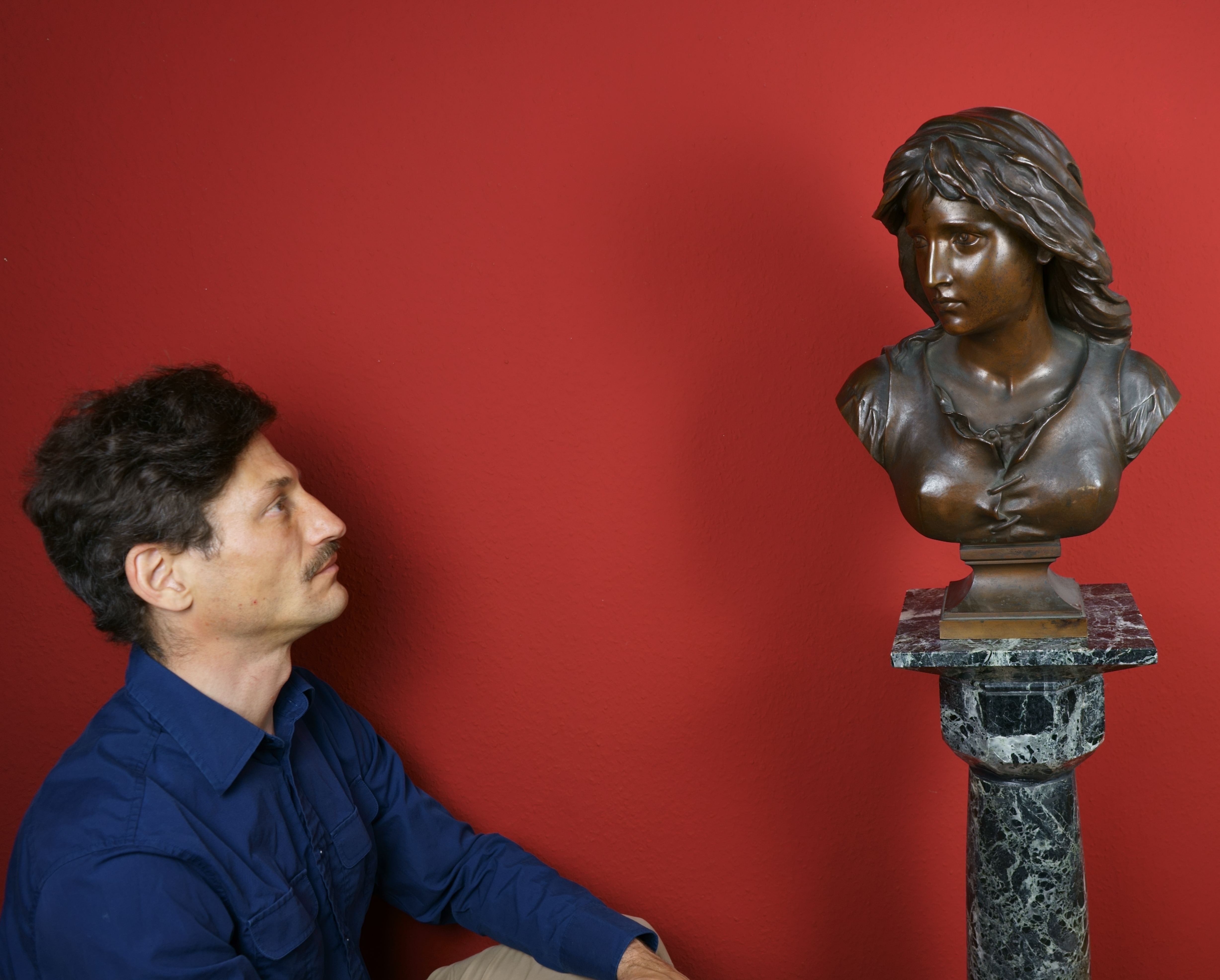
About the Seller
5.0
Vetted Professional Seller
Every seller passes strict standards for authenticity and reliability
Established in 2014
1stDibs seller since 2023
22 sales on 1stDibs
- ShippingRetrieving quote...Shipping from: Berlin, Germany
- Return Policy
More From This Seller
View AllAt the pond / - The longing of the landscape -
Located in Berlin, DE
Hans Thoma (1839 Bernau - 1924 Karlsruhe), At the pond, 1897. Algraph on strong wove paper, published by Breitkopf und Härtel in Leipzig as ‘Zeitgenössisches Kunstblatt Nr. 148’, 23....
Category
1890s Realist Figurative Prints
Materials
Paper
$179 Sale Price
20% Off
Adam and Eve / - United in Death -
Located in Berlin, DE
Hans Thoma (1839 Bernau - 1924 Karlsruhe), Adam and Eve, 1897. Algraph on strong wove paper, published by Breitkopf und Härtel in Leipzig as ‘Zeitgenössisches Kunstblatt Nr. 113’, 44...
Category
Early 1900s Realist Figurative Prints
Materials
Paper
$227 Sale Price
20% Off
Muse / - In the realm of the muses -
Located in Berlin, DE
Hans Thoma (1839 Bernau - 1924 Karlsruhe), Muse, 1893. Algraph on strong wove paper, published by Breitkopf und Härtel in Leipzig as ‘Zeitgenössisches Kunstblatt Nr. 174’, 43.5 cm x ...
Category
1890s Realist Figurative Prints
Materials
Paper
$227 Sale Price
20% Off
Southern German summer landscape / - The profile of the landscape -
Located in Berlin, DE
Hans Thoma (1839 Bernau - 1924 Karlsruhe), Southern German summer landscape, around 1897. Algraph on strong wove paper, published by Breitkopf und Härtel in Leipzig as ‘Zeitgenössisc...
Category
1890s Realist Figurative Prints
Materials
Paper
$179 Sale Price
20% Off
S. Anton Patenkirchen / - The Home of the Landscape -
Located in Berlin, DE
Hans Thoma (1839 Bernau - 1924 Karlsruhe), S. Anton Patenkirchen, 1895. Algraph on strong wove paper, published by Breitkopf und Härtel in Leipzig as ‘Zeitgenössisches Kunstblatt Nr....
Category
1890s Realist Figurative Prints
Materials
Paper
$179 Sale Price
20% Off
Blessed are the spiritually poor / - The Abundance of Poverty -
Located in Berlin, DE
Rudolf Nehmer (1912 Bobersberg - 1983 Dresden), Blessed are the spiritually poor, 1948. Woodcut on yellowish wove paper, 20 cm x 15 cm (image), 45 cm x 30 cm (sheet size), signed “Ru...
Category
1940s Realist Figurative Prints
Materials
Woodcut
$179 Sale Price
20% Off
You May Also Like
Christophorus II - Lithograph by Hans Thoma - 1916
By Hans Thoma 1
Located in Roma, IT
Lithograph realized by Hans Thoma in 1916 on light yellow paper.
Date and monogrammed in the plate.
Hand signed lower right.
Very good condition.
Category
1910s Symbolist Figurative Prints
Materials
Lithograph
Meerwunder - Lithograph by Hans Thoma - 1910 ca.
By Hans Thoma 1
Located in Roma, IT
Lithograph realized by Hans Thoma in 1910 ca.
Printed by Kunstlerbund Karlsruhe AG.
Not signed.
Very good condition.
Category
1910s Modern Figurative Drawings and Watercolors
Materials
Lithograph
Young boy at Loemboeng, 1918
Located in Amsterdam, NL
Young boy at Loemboeng, 1918
Signed with initials and dated, bottom right
Black chalk on paper, 25.7 x 10 cm
Literature:
W.O.J. Nieuwenkamp, Zwerftochten door Timor en Onderhoori...
Category
1910s Art Nouveau Portrait Drawings and Watercolors
Materials
Paper, Graphite
The Creator - Lithograph by Hans Thoma - 1919 ca
By Hans Thoma 1
Located in Roma, IT
Lithograph realized by Hans Thoma in 1919 ca.
Not signed.
Very good condition.
Category
1910s Modern Figurative Drawings and Watercolors
Materials
Lithograph
Der Zeichner - Etching by Unknown Artist of circle of Max Klinger
Located in Roma, IT
Der Zeichner is a superb etching made around 1900 by a still unknown author, but surely from the circle of Max Klinger (Leipzig, 1857 - Grossjena, 1920).
Title on plate in the lower margin in the center. Posthumous impression of a matrix by an unknown author.
The style refers to the Griffelkunst and the prescriptions of the Max Klinger "school of stylus"and of the artists who were close to him. In particular, for the subject in question, in the circle of Max Klinger, Saschia Schneider stands out, who placed male...
Category
Early 1900s Symbolist Figurative Prints
Materials
Etching
The Shandy Bath - Etching by Raphael Drouart - Early 20th century
Located in Roma, IT
The Shandy Bath is an Original Etching realized in the Early 20th Century by Raphael Drouart (1884-1972).
The artwork is in good conditions
Titled on the rear.
The artwork represe...
Category
Early 20th Century Modern Figurative Prints
Materials
Etching
More Ways To Browse
Antique Kunst
Antique Invitations
Antique Stickers
Antique Nun
Lang Antique
Naked Boy
Wesselmann Foot
Western Airlines Poster
Whistler Original Print
William Greengrass
Winslow Homer Etchings
Zodiac Sign Hebrew
1790 Lithograph
1800s Vintage Dresses
1940s Vintage Pin Up Art
1972 Pontiac
1980s Vintage Museum Poster
Alec Monopoly Signed
